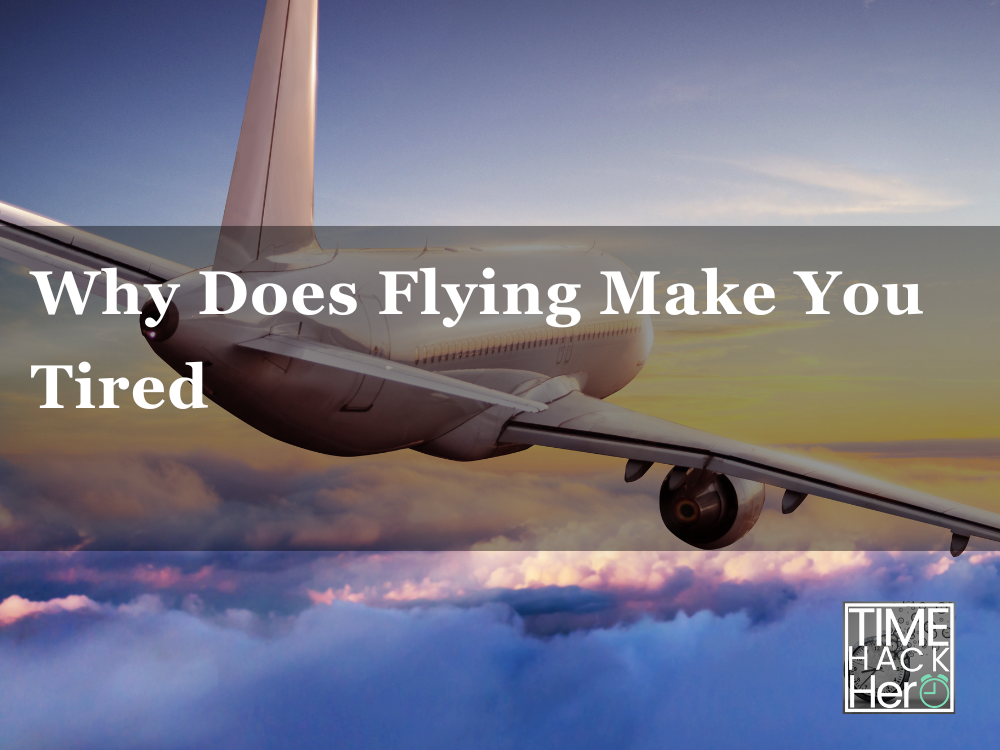It’s a common experience for many travelers – you get off a flight feeling exhausted, yet all you did was sit in your seat the entire time. Flying can make people feel more tired than other forms of travel like driving or taking the train. But why does this happen? Is it normal to feel fatigued after air travel? In this article, we’ll explore the reasons flying can make you feel worn out, the effects of fatigue after flying, and tips to help you arrive at your destination feeling refreshed.
Table of Contents
Is This Normal?
Feeling tired after a flight is completely normal. A number of factors related to airline travel can contribute to fatigue, especially on long flights. The abnormal cabin environment, like lower oxygen levels, dry air, noise, and cramped seating all affect energy levels. The mere act of sitting still for an extended period can also play a role. One study found that 75% of passengers report feeling tired after air travel. So if you feel more drained than usual after your next flight, you’re definitely not alone.
Why Does Flying Make You Tired?
It’s extremely common to feel drained and jet lagged after a long flight. But why does flying leave you so utterly exhausted compared to other forms of travel? There are some unique factors that contribute to “airplane fatigue.”
| Cause | Mechanism | Effect |
|---|---|---|
| Circadian disruption | Desynchronized melatonin signaling | Jet lag and fatigue |
| Dehydration | Extremely dry cabin air | Headaches, difficulty concentrating |
| Low oxygen | Reduced air pressure | Hypoxia, impaired mental performance |
| Immobility | Cramped space, limited movement | Muscle tension and stiffness |
| Noise, vibration | Engine rumbling, turbulence | Sleep disruption and subtle muscular exertion |
| Sensory deprivation | Lack of fresh air and nature | Mental drain |
| High cognitive workload | Processing information, hyper-vigilance, problem-solving | Mental exhaustion |
| Greater illness susceptibility | Recirculated air, close proximity | Energy diverted to fighting infections |
Disrupted Circadian Rhythms
Flying across time zones plays havoc with your body’s innate circadian rhythms that regulate sleep-wake cycles:
1. Melatonin Imbalance
The hormone melatonin controls your sleep/wake schedule based on light exposure.
Rapid timezone changes confuse melatonin signaling, making it hard to feel alert or sleepy at appropriate times.
2. “Jet Lag” Desynchronization
Your circadian clock gets “desynchronized” from the daylight/nighttime cycle at your destination, leaving you fatigued at the wrong times until you adjust.
This circadian disruption is compounded by additional factors below.
3. Dehydration
The extremely dry air in airplane cabins contributes significantly to dehydration:
- Airplane cabin air has only 10-20% humidity because higher humidity risks condensation issues at high altitudes.
- You lose more water vapor with every breath you exhale into the bone-dry cabin air.
- Recirculated air also spreads germs, which your immune system combats by further increasing fluid loss.
- Dehydration headaches, fatigue, and impaired concentration result. Be sure to drink fluids regularly while flying.
4. Low Oxygen Saturation
Airplane cabins are pressurized to simulate ~8000 ft altitude, reducing oxygen:
- At 8000 ft, oxygen saturation drops to ~90% compared to ~98% at sea level.
- Reduced oxygen availability leads to hypoxia, impairing mental and physical performance.
- Lack of oxygen taxes your body and drains energy as it works harder to function.
5. Immobility and Poor Posture
The cramped airplane seats and limited mobility also take a toll:
- Remaining seated in one position for hours prevents circulation and increases risk of deep vein thrombosis.
- Poor posture with little ergonomic support leads to back, neck, and joint stiffness.
- Restricted mobility impedes lymphatic circulation, contributing to swollen legs.
- Muscle tension from staying still tires the body. Regular movement is key.
6. Noise, Vibration, and Sensory Deprivation
The airplane environment stresses the senses:
- Low-frequency rumbling sounds from the engines disturb sleep. Noise-cancelling headphones help.
- Vibration causes subtle muscular exertion to continuously stabilize the body against turbulence.
- Lack of nature sights and fresh air deprives you of sensory inputs that energize the mind and body.
This sensory assault wears you down.
7. High Cognitive Workload
Flying requires significant mental exertion:
- Navigating airports, going through security, locating gates involves intense information processing.
- Monitoring time zones, departure times, transit routes demands hyper-vigilance to avoid mistakes.
- Unfamiliar languages, signs, coins, and social interactions necessitate extra focus and concentration.
- Solving problems with delayed flights, lost luggage, rental cars requires high-level cognitive stamina.
8. Greater Susceptibility to Illness
Recycled air, close proximity to others, and a suppressed immune system also increase risk of picking up illnesses when flying:
- Viruses like influenza, adenovirus, and coronavirus spread easily across shared cabin air.
- Exposure to new pathogens your immune system hasn’t encountered leaves you vulnerable.
- Fighting off foreign bacteria and viruses consumes significant mental and physical energy.
Ways to Prevent and Overcome Air Travel Fatigue
Luckily, there are things travelers can do before, during, and after flights to reduce fatigue:
Light exercise before the flight
A short workout helps boost energy levels so you aren’t starting off tired. Stretches and resistance band exercises can be done in the airport waiting area.
Stay hydrated
Drinking plenty of water, avoiding alcohol, and using moisturizing eye drops curbs dehydration and dryness.
Pack smart
Bring neck pillows, eye shades, noise-canceling headphones, compression socks, and comfortable clothing.
Strategic napping
Time short 20-30 minute naps to maximize energy without disrupting sleep cycles.
Avoid heavy meals
Eat small, light meals and snacks throughout the flight rather than one large meal.
Move around
Take occasional brief walks, perform seat stretches, flex ankles, and bend knees.
Set body clock
If crossing time zones, start adjusting sleep schedules a few days pre-trip. Use light exposure, melatonin, and fasting strategies.
Limit caffeine
Drink only 1-2 caffeinated beverages; more can worsen jet lag and sleep loss.
Stay positive
Lower pre-trip stress and use mental techniques like meditation to make resting easier.
Prioritize post-flight sleep
Take time to fully recover sleep upon arrival before jumping into activities.
Conclusion
Feeling drained and drowsy after airline flights is very common due to the unique conditions associated with air travel. Lower oxygen, dry air, jet lag, constant noise, restricted movement, and disrupted sleep rhythms all contribute to fatigue. While flying will always be tiring, utilizing prevention strategies can help passengers arrive at their destinations feeling refreshed and ready to enjoy their trips. Following fatigue reduction tips will lead to safer, healthier travels.
Frequently Asked Questions
What’s the main reason flying is so tiring?
The low cabin air pressure is the primary factor causing fatigue during flights. At cruising altitudes, airplane cabins are pressurized to just 15-25% of oxygen levels at sea level. This reduction leads to hypoxia or oxygen deprivation, which directly results in tiredness and lowered energy.
Do short flights cause fatigue too?
Yes, short flights can still lead to exhaustion. Duration likely plays less of a role than pressurization, humidity, immobility, and other issues that affect all lengths of air travel. Flights under 3 hours may not cause severe jet lag, but other fatigue factors still apply.
Is fatigue worse at certain ages?
Older adults often experience more flight fatigue due to natural declines in cardiovascular and respiratory function. Their bodies cope with oxygen changes more poorly. Children also seem to have greater drops in oxygen saturation, perhaps due to their still-developing respiratory systems.
Should you nap on the plane?
Strategic short naps of around 20-30 minutes can boost energy levels without negatively altering sleep cycles. Time naps for early or late in flights when drowsiness is highest. Avoid napping close to bedtime at your destination so you can fully adjust.
What’s the best way to avoid airport fatigue?
If possible, avoid layovers and choose direct nonstop flights to reduce time spent in airports. Bring snacks, empty water bottles, and neck pillows to make wait time more comfortable. Walk around rather than just sitting. Hydrate after going through security.









